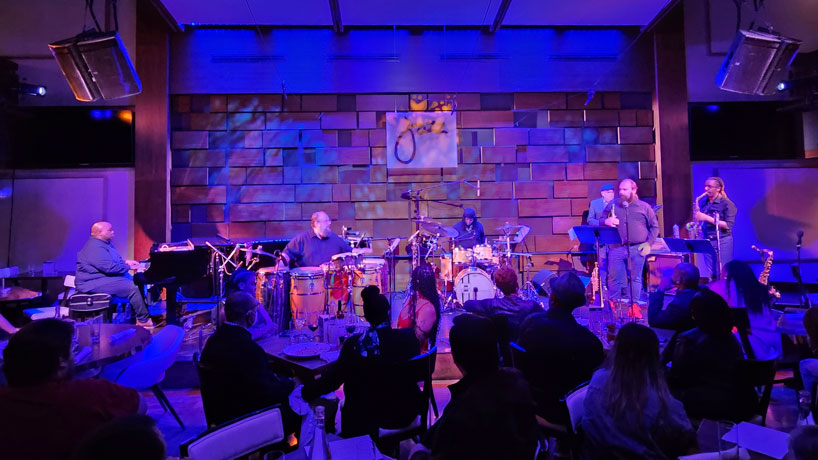
Matt Henry, director of percussion studies and associate teaching professor of music, led his sextet, Agbara, in two shows at Jazz St. Louis last week to bring his research on Afro-Cuban jazz to the stage. (Photo by Wendy Todd)
Matthew Henry, director of percussion studies and associate professor of music at the University of Missouri–St. Louis, led an evening of Afro-Cuban-influenced jazz when the Agbara Sextet performed at Jazz St. Louis last week.
Henry teamed up with Adaron Jackson, director of jazz studies at UMSL; Zeb Briskovich, jazz bass instructor for Southern Illinois University; and several of his former students, Desiree “Dez” Jones, Dustin Shrum and Kwanae Johnson; to play two nights at Jazz St. Louis last week to showcase and celebrate the fusion of African and Cuban influences on jazz.
Henry has been researching the genre, and taken four trips to Cuba, with another planned in the near future. During those trips, he studied the religious drumming based on the Yoruba people of Nigeria. Yoruba drumming, traditionally, is used as a form of communication between humans and spirit. Henry formed the sextet Agbara, named for the Yoruba word for vigor, energy and power, to put what he learned into practice and welcomed the opportunity to play at the Grand Center venue.
“The purpose of this project is basically for me to put my research into Afro-Cuban culture onto the stage,” Henry said.
The evening was dubbed “UMSL Night at Jazz St. Louis” to welcome students, faculty and staff to enjoy the performance. Deborah Godwin, senior director of development in the UMSL College of Arts and Sciences, did just that.
“It was a great show,” she said. “The performance far exceeded my expectations. I was so proud of our music graduates and our faculty.”
The set included selections from well-known jazz artists such as Roy Hargrove and Dizzy Gillespie, with a cover of the trumpeter’s “Night in Tunisia,” as well as other musicians who are better known among jazz aficionados including Alfredo Rodriguez and Arturo Sandoval. After playing “Mambo Influenciado,” an up-tempo Latin folk tune by Chucho Valdes, Henry, who has been teaching at UMSL for nearly 20 years, became emotional.
“We have to carry on the values we possess,” he told the audience, referring to the night’s theme of cultural celebration and inclusion. Henry even recruited another former student from the audience, Jacob Brewer, who graduated last fall with a BA in music, to play a solo on the congas.
“It was so fun being able to perform on that stage with such great musicians and instruments,” Brewer said. “Something awoke in me when I started to play and it felt like it was just me and the drums on that stage.”
Along with being entertained, Henry wanted attendees to learn a bit about African and Latin cultures, particularly as they pertain to culture and music in the United States.
“Every time I do one of these shows, I try to talk about why I wanted to put this together and the connection of African aesthetics inside of our practice of music in the United States,” he said. “I think you can learn that we all appreciate African aesthetics, whether we realize it or not. And basically, all of our pop music in the United States is African aesthetics on Western European instruments. So what you learn is maybe to appreciate the depth of culture regarding what goes into what we call Latin jazz and sort of honor those traditions in the best way possible.”
Philipe Linhares, a Brazilian native visiting St. Louis, attended the show and connected to the music.
“I loved it,” he said. “It was great. The rhythm – it reminded me of home.”














